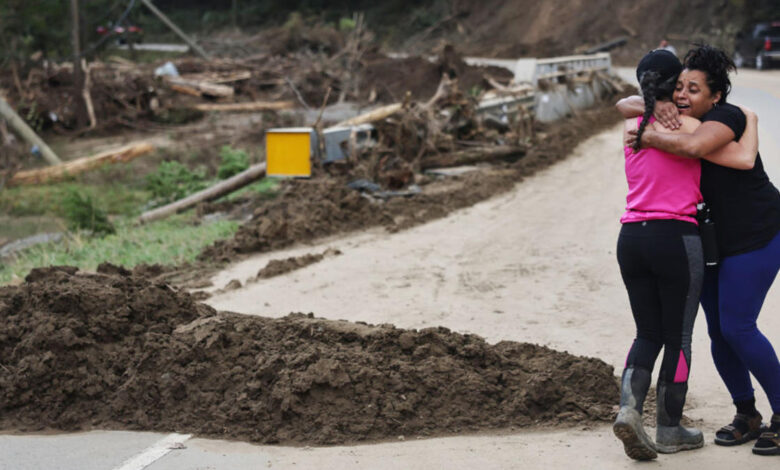In the Aftermath of Hurricane Helene: Devastation and Resilience as 5 Asheville Residents Share Their Community’s Response.

At the crack of dawn—3:30 a.m. to be precise—Mark Starling, a stalwart figure in the Asheville media landscape, took to the airwaves as the morning show host and news director for iHeart Media-Asheville on News Radio 570 WWNC. With the city still reeling from the catastrophic onslaught of Hurricane Helene, which left a trail of destruction through western North Carolina, his mission was crystal clear: keep the shaken local populace informed and instill a sense of calm in the midst of chaos. Yet the weight of the tragedy struck hard. Starling himself had seen neighbors swept away, their homes destroyed, a loss that cut uncomfortably close to the bone.
“We’ve lost some of our dear neighbors—homes and lives swept away in an instant,” he shared with Yahoo Life, his voice trembling with emotion. “People were literally just swept away.”
Starling recounted a harrowing personal ordeal—his wife, son, and four dogs trapped in floodwaters, seeking refuge at a gas station during the tempest. “I lost contact with them,” he recalled, anxiety palpable in his tone. Hours passed before he could finally breathe a sigh of relief, grateful that fortune smiled upon them; “We’re incredibly lucky that we all emerged unscathed,” he added, though uncertainty loomed regarding his return home due to ongoing power and water outages.
Living out of the radio station, Starling painted a grim picture: his team submerged in discomfort without running water, showering a distant memory. “Portable toilets are on their way,” he said, navigating through a reality powered by generators and Starlink units, relying on a ham radio for news when the internet flickered into oblivion.
“This is home! Our community, our family—it’s time to give back,” he declared. But reality settled like a heavy fog; struggle coursed through his veins. “I keep telling myself, ‘It’s OK to not be OK.’ I say, ‘Don’t get bitter, get better,’ a mantra I’ve carried on my show for decades.”
Starling is just one of countless Asheville residents banding together after their city endured an astonishing 14 inches of rain over a mere three days—equivalent to normal rainfall for an entire season. Officials dubbed the aftermath “biblical devastation,” with over 200 lives perished across multiple states—Florida, Georgia, North and South Carolina, Virginia—and many more still unaccounted for.
“We’re leaning on one another, extending as much love as we can,” Starling reflected. Volunteers delivered nourishment and supplies to the station; employees brought furry companions for comfort. “Pet therapy—now that’s a real thing,” he chuckled, although the laughter was tinged with sadness.
As the community faces ongoing trials—power outages, flooding, the daunting task of excavating homes—anxiety looms large. “Hundreds of thousands are navigating through the worst crises imaginable,” he stated. “They’ve lost everything.”
Voices echo throughout Asheville amidst the debris, expressing not only grief over widespread destruction but also an unyielding focus on the essence of community. “It’s tragedies like these that forge solidarity,” offered Thea Gallagher, a clinical assistant professor at NYU Langone Health and co-host of the Mind in View
In a compelling turn of events, we hear from other resilient souls in Asheville, individuals grappling with immense loss yet finding strength in their community.
‘At some point, we’ll sit down and think about what it means to have lost our livelihood and belongings’
René Treece, a photographer whose studio lies in a flood-ravaged area, provided insight into her reality. “The foundation of my building is askew,” she revealed. “I think it’s gone.”
However, instead of succumbing to despair, Treece kicked into high gear, dispatching funds from family and friends to buy groceries for those in need. “If I see someone with only a handful of items in their cart, I discreetly offer them $50 or $100,” she recounted. “Cash is the only currency accepted right now.”
“I operate in a perpetual state of doing for others,” Treece acknowledged. “It makes everything a bit more palatable.”
The situation took a grave turn for her boyfriend, whose belongings found themselves buried under a foot of mud after he prepped for a new home. “His life is drowned beneath the muck,” she stated. “But rescuing lives is now my priority.”
As difficult conversations await—her daughter safe elsewhere, living arrangements with her boyfriend becoming increasingly complex—Treece expressed determination. “We’ll eventually confront the reality of our losses, but right now our focus is survival.”
‘We’re confronting all of these things that we have no idea how to handle’
Jessica Wakeman, a freelance journalist and previous Mountain Xpress reporter, shared her perspective after residing in Asheville for over three years. “Electricity is intact, but water and the internet elude us,” she explained. “We resort to working at the public library, buckets of water in hand.”
Wakeman’s residence, perched atop a steep incline, escaped physical damage while chaos unfolded below. “The waters claimed signs that towered above me—nearly nine feet high,” she noted, a somber testament to the power of nature.
The psychological weight of calamity weighs heavily. “The emotional toll is significant,” she admitted. “People are deeply troubled, yet thankful for their safety.”
There exists a silver lining amidst the storm; community bonds have tightened. “Meeting neighbors, sharing food, those moments usher in a sense of belonging,” she smiled. “Needless to say, many are coming together, offering basic necessities.”
Wakeman spoke of permanence in Asheville, “We’re committed to our home here,” she affirmed, while also advocating for visitors post-recovery: “We will need that support once the dust settles.”
‘You need something, there are 10 people that will try to help you’
In a collaborative spirit, Brandegee Pierce and Danielle Del Sordo co-founded Pirani, a company promoting sustainable gatherings, and shared their gratitude over the minimal damages they faced. “We’re fortunate,” Pierce expressed, “Just some flooding in our yard and basement. We still have a roof over our heads.”
Nevertheless, their hearts ached for local businesses shrouded in calamity. “The stories of those enterprises—so much passion and hard work, all washed away in an instant—are beyond comprehension,” Pierce lamented.
Yet, from despair sprouts resilience. “Asheville possesses this incredible spirit; it’s breathtaking to witness the unifying effort,” he noted. “In the early aftermath, when connectivity was severed, we were unaware of the widespread devastation,” he recalled, heart wrenching tales of towns like Chimney Rock and Swannanoa emerging from the storm as haunting memories.
In pursuit of shelter and stability, the couple journeyed to Atlanta, longing for their home base while wrestling with guilt. “Leaving our community felt unbearable,” Pierce admitted. “Watching our loved ones endure this pain is troubling.”
In the face of hardship, neighbors unshackled themselves from despair. “Group chats thrive as people rally together offering fuel, food, and support,” Pierce revealed. “You need something, and there are ten people willing to lend a hand.”
‘We will dig out and come back stronger than ever. We have no choice’
Eddie Foxx, a native son, hosts The Eddie Foxx Show on 97.9 iHeart Radio, alongside his wife Amanda. His family—a mere 15 minutes from Asheville in Weaverville—faced power outages since Friday morning yet counted themselves among the lucky ones, noting, “We’ve had no damage,” despite the tragedy surrounding them.
Foxx reflected on their initial disbelief; the hurricane’s potency seemed a distant threat. “We hadn’t endured a power outage since ‘93—surely, it wouldn’t be us!” he mused, grappling with the surreal reality of it all.
Driving through the scarred city only deepened his sorrow. “It was heart-wrenching—vans overturned, vehicles wedged against poles, buildings reduced to rubble. Each mile revealed fresh devastation,” he shared, tears mingling with community spirit as he and his wife processed the scenery.
Habit recollected Foxx’s past reporting on tragedies; irony unfolded as he stood now on the receiving end of communal support. “The kindness of Burlington folks is extraordinary,” he noted, “even before confirming their family’s safety, they were already mobilizing to assist others.”
Community resilience emerged as a central theme. “We will sift through the debris and rise stronger than ever; we have no choice,” Foxx affirmed, resolve simmering beneath the surface. “Together, we shall emerge from this tumultuous journey.”
This narrative contains affiliate links; clicking on such links may result in earning a commission on any purchases made.




